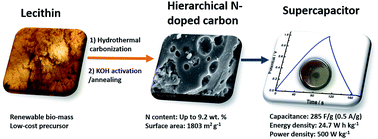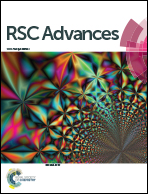Hierarchical nitrogen-doped porous carbon derived from lecithin for high-performance supercapacitors
Abstract
The development of renewable carbon sources for sustainable energy storage applications is of significance importance. Herein, we report the synthesis of three-dimensional N-doped carbons derived from lecithin via a simple route. Hierarchical porous carbons with high surface area (up to 1803 m2 g−1) and nitrogen-doping level (up to 9.2 wt%) were successfully prepared by hydrothermal carbonization and a subsequent thermal annealing. The electrochemical performance of the carbon electrodes was examined with both two and three-electrode cell configurations in 1 M KOH and 1 M H2SO4 electrolytes. The as-prepared NC-800 electrode features a large specific capacitance (285 F g−1 at 0.5 A g−1), high-rate capacitive behavior, and long-term cycling stability (8% loss after 20 000 cycles). Furthermore, NC-800 exhibits an energy density of 24.7 W h kg−1 at a power density of 500 W kg−1 in 1 M H2SO4. The excellent electrochemical performance of N-doped carbons is attributed to the unique hierarchical porous frameworks along with pseudocapacitive effect. This work opens up a new approach for preparation of hierarchical N-doped porous carbon materials with tailored properties for supercapacitor applications.



 Please wait while we load your content...
Please wait while we load your content...